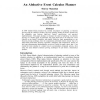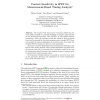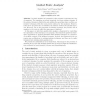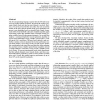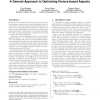1210 search results - page 153 / 242 » Formal Techniques for Java Programs |
121
click to vote
JLP
2000
15 years 1 months ago
2000
In 1969 Cordell Green presented his seminal description of planning as theorem proving with the situation calculus. The most pleasing feature of Green's account was the negli...
189
Voted
ISOLA
2010
Springer
15 years 2 days ago
2010
Springer
Abstract. The Implicit Path Enumeration Technique (IPET) has become widely accepted as a powerful technique to compute upper bounds on the Worst-Case Execution Time (WCET) of time-...
101
Voted
SAS
2007
Springer
15 years 8 months ago
2007
Springer
In static analysis, the semantics of the program is expressed as a set ions. The equations are solved iteratively over some abstract domain. If ract domain is distributive and sati...
129
Voted
SAS
2009
Springer
16 years 2 months ago
2009
Springer
The Java programming language requires that out-of-bounds array accesses produce runtime exceptions. In general, this requires a dynamic bounds check each time an array element is...
137
click to vote
AOSD
2009
ACM
15 years 9 months ago
2009
ACM
Many aspects for runtime monitoring are history-based: they contain pieces of advice that execute conditionally, based on the observed execution history. History-based aspects are...
